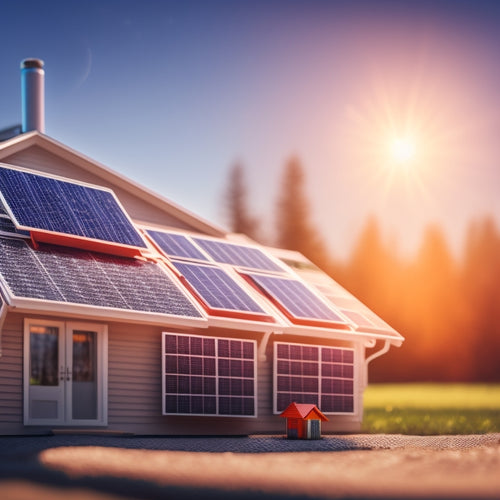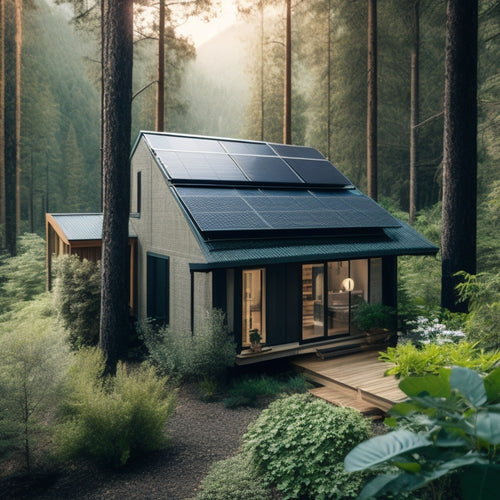
Why Switch to Renewable Home Heating Systems
Share
You're likely considering switching to a renewable home heating system because you want to reduce your carbon footprint, lower your energy bills, and increase your property's value. By utilizing solar power efficiency, you can reduce your reliance on fossil fuels and benefit from government incentives like tax credits and rebates. Renewable systems also provide a reliable and consistent heat source, increasing your property's appeal and resale value. With potential energy bill reductions of up to 50%, it's a smart investment for your wallet and the planet. Now, investigate the specific advantages that make renewable heating systems an attractive choice for your home.
Key Takeaways
- Transitioning to renewable home heating systems reduces carbon footprint, mitigating climate change and promoting a sustainable future.
- Renewable energy sources like solar, geothermal, and biomass provide substantial energy bill reductions, up to 50%, and energy independence.
- Government incentives, including tax credits and rebates, make switching to renewable systems more affordable and accessible for homeowners.
- Renewable heating systems increase property value, appeal, and marketability, leading to faster sales and higher offers, with a potential 3-5% value increase.
- Advanced renewable systems ensure a reliable, consistent, and worry-free heating experience with lower maintenance needs and fewer breakdown risks.
Harnessing Solar Power Efficiency
As you consider utilizing solar power for home heating, it's essential to understand the significance of efficiency in solar collector design.
Solar panel efficiency plays a fundamental role in the overall performance of solar thermal systems. A well-designed solar collector can greatly increase the system's ability to convert sunlight into usable heat.
When selecting a solar thermal system, look for high-efficiency solar panels that can maximize energy output, such as those utilizing advanced MPPT technology to enhance energy capture.
Additionally, consider factors such as collector material, tube spacing, and insulation to guarantee peak performance, as well as the importance of charging efficiency in solar panel battery chargers.
Reduce Your Carbon Footprint Now
Your carbon footprint, a measure of greenhouse gas emissions, directly correlates with your energy consumption. As you rely on fossil fuels for heating, you contribute to climate change.
However, you can reduce your carbon footprint now by shifting to renewable home heating systems, such as geothermal heating systems, which make use of the earth's consistent ground temperature for efficient heating and cooling.
Investigate sustainable heating options like heat pumps, biomass boilers, or solar thermal systems, which greatly decrease greenhouse gas emissions.
Implementing carbon offset strategies, such as reforestation or renewable energy projects, can further compensate for your remaining emissions.
Lower Your Energy Bills Dramatically
By opting for renewable home heating systems, you'll not only reduce your carbon footprint but also reap significant financial benefits.
One of the most substantial advantages is the drastic reduction in energy bills. Renewable energy sources like solar and geothermal energy are more efficient than traditional fossil fuels, resulting in lower energy consumption.
Additionally, energy efficient appliances and thermal insulation can further minimize heat loss, reducing the amount of energy needed to heat your home. With renewable home heating systems, you can expect to save up to 50% on your energy bills, depending on the system and your current energy usage.
By embracing energy independence through solar power systems, you can generate clean energy, reducing your reliance on grid electricity and minimizing the impact of grid outages.
This significant cost savings can help offset the initial investment in renewable energy technology, making it a financially smart decision in the long run.
Government Incentives for Homeowners
When you invest in renewable home heating systems, you're not only reducing your energy bills, but you're also eligible for various government incentives.
Development of energy literacy is essential for traversing the complex renewable energy environment understanding technical aspects.
You can claim tax credits for a portion of your upgrade costs, which can help offset the initial investment.
Additionally, you may be able to take advantage of rebate opportunities and grants that can further reduce your out-of-pocket expenses.
Tax Credits Available
Many homeowners have already taken advantage of tax credits offered by the government to offset the cost of installing renewable home heating systems. You can also benefit from these incentives, which can greatly reduce the upfront cost of switching to a renewable energy system.
| System Type | Tax Credit Eligibility | Renewable Energy Incentives |
|---|---|---|
| Solar Water Heater | 26% of total cost | Up to $2,000 |
| Geothermal Heat Pump | 26% of total cost | Up to $2,000 |
| Biomass Stove | 26% of total cost | Up to $2,000 |
| Fuel Cell | 22% of total cost | Up to $1,500 |
| Wind Turbine | 22% of total cost | Up to $1,500 |
Be certain to consult with a tax professional to determine your eligibility for these credits and to guarantee you're taking advantage of all the available incentives.
Rebate Opportunities Exist
In addition to tax credits, government rebate opportunities exist to further offset the cost of renewable home heating systems.
You can take advantage of rebate programs offered by state and local governments, as well as utilities, to reduce the upfront cost of installation. These financial incentives can help make renewable home heating systems more affordable, making the shift to clean energy more accessible.
For instance, some states offer rebates for homeowners who install heat pumps or solar thermal systems. Additionally, utility companies may provide rebates for customers who upgrade to energy-efficient heating systems.
Grants for Upgrades
Beyond rebates, homeowners can tap into government grants designed to incentivize upgrades to renewable home heating systems.
These grants provide additional funding sources to support your shift to energy-efficient solutions. You can investigate various programs that offer financial assistance for upgrading to renewable heating systems, such as:
-
The Department of Energy's Weatherization Assistance Program, which provides grants to low-income households for energy-efficient upgrades
-
The Environmental Protection Agency's (EPA) State and Tribal Assistance Grants, which fund projects that reduce greenhouse gas emissions
-
The Rural Utilities Service's (RUS) Energy Efficiency and Conservation Loan Program, which offers loans for energy-efficient improvements in rural areas
Increase Your Property's Value
By installing a renewable home heating system, you'll not only reduce your carbon footprint but also enhance your property's selling price, attracting eco-friendly buyers who are willing to pay a premium for sustainable features.
This can lead to a significant increase in resale value, making your property more competitive in the market.
As you consider investing in a renewable heating system, it's crucial to understand how it can impact your property's value and appeal to potential buyers.
Boost Selling Price
Installing a renewable home heating system can greatly enhance your property's appeal to potential buyers, subsequently increasing its selling price.
As energy efficiency becomes a top priority in today's market trends, having a renewable heating system in place can be a major selling point.
Here are some ways it can elevate your property's value:
-
A renewable heating system can reduce your carbon footprint, making your property more attractive to environmentally conscious buyers.
-
It can also lead to significant cost savings on energy bills, which can be a major draw for potential buyers.
-
Additionally, a renewable heating system can increase your property's energy efficiency rating, making it more competitive in the market and potentially leading to a higher selling price.
Attract Eco-Friendly Buyers
As you highlight your property's renewable heating system to potential buyers, you'll likely attract a specific type of buyer: the eco-friendly enthusiast.
These eco-conscious buyers prioritize sustainable living and seek out homes that align with their values. By installing a renewable heating system, you're catering to this demographic and increasing your property's appeal.
This can lead to a faster sale and more competitive offers, as these buyers are often willing to pay a premium for environmentally friendly features.
Increase Resale Value
Several studies have shown that homes equipped with renewable heating systems can command a significant premium over comparable properties without such features.
This increased value is driven by market demand for eco-friendly properties, as more buyers prioritize environmental sustainability. By installing a renewable heating system, you can enhance your property's appeal and attract potential buyers who are willing to pay a premium for sustainable features.
- Renewable heating systems can increase your property's value by 3-5%
- They can also reduce marketing time by up to 50%, as eco-conscious buyers are more likely to make an offer quickly
- Additionally, renewable heating systems can provide a competitive edge in a crowded market, setting your property apart from others in the area
Reliable and Consistent Heat Source
With renewable energy sources, you can enjoy a reliable and consistent heat source for your home.
Renewable heating systems are designed to provide a steady flow of warmth, even on extremely cold days. This is due to advanced heat retention capabilities, which allow the system to store excess heat energy for later use. As a result, you'll experience fewer temperature fluctuations and a more comfortable living space.
Additionally, system reliability is a key benefit of renewable heating systems. With fewer moving parts and less reliance on fossil fuels, these systems are less prone to breakdowns and maintenance issues. This means you can enjoy a worry-free heating experience, knowing that your system will perform consistently throughout the year.
Break Free From Fossil Fuels
How much longer will you rely on finite fossil fuels to heat your home? Fossil fuels are a depleting resource, and their continued use contributes to climate change.
By switching to renewable home heating systems, you can break free from fossil fuels and changeover to sustainable alternatives.
Some benefits of doing so include:
- Reducing your reliance on finite resources
- Lowering your carbon footprint and contributing less to climate change
- Achieving energy independence and reducing your energy bills
Renewable home heating systems offer a reliable and consistent heat source while promoting a cleaner, more sustainable future.
Make the switch today and start enjoying the benefits of renewable energy.
Frequently Asked Questions
Can I Install Renewable Heating Systems in an Old House?
As you consider upgrading, note that 40% of UK homes are over 50 years old, just like yours. You can install renewable heating systems, but be prepared to overcome energy efficiency obstacles and unique installation challenges in older properties like yours.
How Long Does It Take to Recoup the Investment Cost?
You'll typically recoup the investment cost of a renewable heating system within 5-10 years through reduced energy bills and government incentives, achieving an investment payback that's swift and substantial, thanks to significant cost savings.
Are Renewable Heating Systems Noisy or Obtrusive?
You'll find that modern renewable heating systems, like heat pumps and solar thermal, operate quietly, with noise levels similar to a refrigerator, and can be discreetly placed, allowing you to reap the benefits without visual or auditory disturbance.
Can I Use Renewable Heating Systems for Hot Water Too?
You can use renewable heating systems for hot water too, leveraging solar water heaters or heat pumps that efficiently provide hot water, even in colder climates, without compromising performance or reliability.
Do I Need to Replace My Existing Radiators and Pipes?
You're thinking you'll need to rip out your entire heating system, but surprisingly, you won't. Your existing radiators are likely compatible, and with proper pipe insulation, they'll work seamlessly with your new renewable heating system, minimizing the need for replacements.
Related Posts
-

A Beginner's Guide to Navigating the Solar Investment Tax Credit
You're eligible to claim a significant Solar Investment Tax Credit (ITC) of 30% of total installation costs, but mane...
-

Essential Hiking Lights for Safety and Fun
When you're hitting the trails, essential hiking lights are vital for safety and fun. A lightweight headlamp offers h...
-

Off Grid Solar Batteries
As you shift to off-grid living, you'll rely on high-performance solar batteries to store excess energy generated by ...


